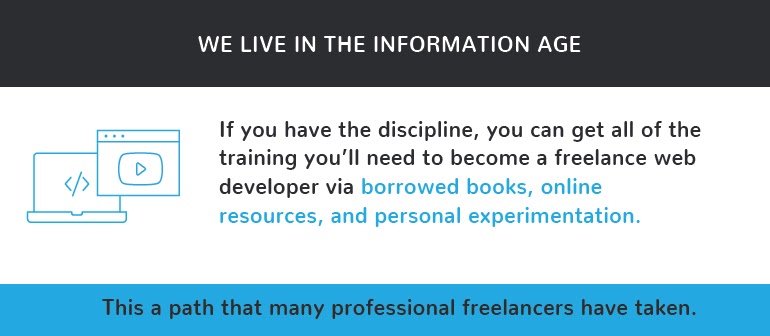There are a lot of good reasons to want to break into web development. And with this demand comes other benefits, such as a web developer salary and the freedom to employ your skills across nearly any industry and interest.
But before you can start experiencing the joys of working in web development, you’re going to have to make that leap from interested to employed, and if you don’t know what you’re doing, that can be a difficult chasm to cross.
Well, never fear; Devmountain has you covered. That’s why we’ve created this handy five-step guide to help you turn your web dev dreams into reality, by landing your first entry-level web developer job.
So, let’s get started.
First Things First: What Is a Web Developer?
At the risk of over-generalizing, it’s fairly safe to say that the modern digital world runs on the internet. But the internet that most people and businesses deal with on a daily basis is actually an information-sharing model that sits on top of the foundational network infrastructure. That’s because when we use the internet, we’re usually doing so through the user-friendliness of the front end web. More specifically, we’re using web sites. And that’s where web developers come in.
A web developer is a computer programmer that specializes in developing applications and sites for use on the web. This is usually accomplished through the use of various computer programming languages, such as HTML, CSS, JavaScript, React, Ruby, and others. The specifics of the job itself will vary significantly from company to company, but the basics — building web apps using programming languages — are at the heart of what a web developer is. This is different from software development or mobile app development since web developers only work with websites.
Entry-level web developers are most likely to get junior web developer jobs, so that’s what this guide will focus on. But don’t worry. The junior in the title just means that you’ll probably be working under the supervision of a senior developer or developers. Once you’ve gained some good real-world experience, the transition from junior- to mid-level or senior-level developers shouldn’t be a difficult one to make.
Okay, with that in mind, let’s talk about steps.
Step 1: Develop Your Skills
It may seem obvious, but it’s worth noting that before you can land a junior web developer job, you’ll need to develop the necessary skills. This isn’t the kind of position where you can depend entirely on on-the-job training to get you up to speed. In fact, you can expect programming knowledge (often in the form of tests) to be a major part of the hiring process, so getting a good education needs to be your first step.

But what kind of education should you pursue?
You could pursue the traditional path of earning a computer science degree from a college or university. A college education will give you a good foundation for the history, theory, and practice of computer programming. It will also demand a significant amount of both time and money — particularly if you’ve already earned a different degree but are interested in making a career change.
If that doesn’t seem like the right choice for you, consider enrolling in a coding bootcamp.
Coding bootcamps use accelerated, hands-on learning environments to teach prospective programmers the skills they need to get their first junior web developer jobs. Bootcamp tuitions generally cost less than the price of earning a full college degree, and they offer courses that can be completed in a fraction of the time (usually within a matter of months instead of years).
An important thing to note is that most bootcamps offer certifications instead of degrees. Their instructors focus on teaching vital technical skills so that bootcamps can ensure new developers can build effective portfolios and demonstrate coding proficiency by the end of one of their programs.
And naturally, make sure to keep up with your informal training as well. Read up on a variety of related topics, keep informed about industry news, be active on developer forums, and always be working on projects of your own.
Step 2: Build That Portfolio
A degree or certification can show prospective employers that you know how to complete course work and take instruction, but it’s your portfolio that will show them that you know how to put that knowledge to practical use. So, get started on building a portfolio site.
Some bootcamps include mentorship programs. These trained advisors can help ensure that your portfolio showcases the skills that employers are looking for. That said, at the end of the day, designing, coding, and launching your portfolio is going to be your responsibility.
Your online portfolio can include both personal and professional projects (if you’ve done any paid work for clients and are able to get their permission). What’s most important is that the work you display demonstrates your skill level and attention to detail.
Step 3: Get Involved in the Community

Sometimes it’s not just about what you know; it’s also about whom you know. Networking — building individual, professional and social contacts — is invaluable when you’re getting started. These contacts can provide you with vital career advice and may even give you the inside scoop on new job opportunities.
Hiring events, hackathons, and alumni nights offered by coding bootcamps are a great place to build connections with those who’ve already established themselves in the industry. Just make sure that you don’t show up empty-handed; bring physical copies of your resume and don’t hesitate to show off your portfolio.
Of course, web development is a digital industry, so don’t neglect online networking opportunities. In addition to being active on forums, you can put your coding skills to use by contributing to open-source projects and creating a Github account to show off what you can do. Just make sure to keep the code clean, concise, and well-documented because employers are going to want to know that you can not only do the job but that you can do it well.
Step 4: Don’t Skimp on the Resume or the Cover Letter

If you’ve got a great portfolio, do you really need a traditional resume and cover letter?
Yes, you do.
There are several reasons why resumes are still a big part of the hiring process. For one thing, resumes provide a clear, easy-to-read summary of your professional skills and experiences. For another, many companies won’t even consider applicants unless they provide a resume and cover letter.
But this isn’t necessarily a bad thing. In fact, a good resume and cover letter can help you stand out from other candidates. Just make sure that you’re sharing relevant information in a way that is easily skimmable and specifically tailored to each company you apply to. The cover letter should be even more customized to the company. That means it’s up to you to do the research so you can discuss their business, identify possible trends, and really home in on what you can bring to the table.
Take your time and create a resume that will be worth more than just a passing glance so you can be one step closer to your first junior web developer job.
Step 5: Nail the Interview
Okay. You’ve got your education and evolved your skills. You’ve built an impressive portfolio and established some good professional relationships. You’ve created your resume and cover letter. The only thing still standing in your way is the interview process.
So go out there and get some interviews.
As this is your first web development position, your best bet is to apply to as many places as possible. Search on job listing sites and reach out to your contacts to ensure that you’re casting a wide net. And don’t worry about being in love with every company you reach out to. Many won’t even bother responding, but that’s okay because you’ll still be getting valuable practice and a clear understanding of what businesses are looking for.
Likewise, feel free to apply to positions you may not feel completely qualified for. Employers sometimes like to list more requirements than are necessary, but if it’s a junior web developer position and you have a solid educational background, you should be able to make it work.
The interview itself may be a bit more intensive. In addition to the standard interview tips and etiquette (arriving early, speaking clearly, following up after, etc.), web developer job interviews may include a technical interview. This is essentially a test of your ability to code.
The interviewer will give you a problem, which you then have to come up with a solution for. You may be asked to write out your solution on a whiteboard or work within a collaborative editor program.
Sound stressful? That’s part of the point.
Interviewers want to know how well you can work under pressure to solve problems on the fly, and it may take you a few interviews before you become comfortable with the process.
As you work through the problem, don’t be afraid to ask questions if you need to, and always talk the interviewer through your process — how you work through problems can be just as important to employers as whether or not you get the right solution.
It may take a few interviews before you land an entry-level web developer job. But for every interview that doesn’t turn out in a job offer, you’ll be gaining experience and improving.
It’s a Wide, Wide Web
There’s a demand right now for web developers. And if current trends are anything to go by, that demand is only going to increase and bring with it opportunities and competitive developer salaries. After all, it’s a big web and it’s only getting bigger. And as a web developer, you’ll be at the forefront of that revolution.
But first, you’ll need to land your first junior developer job. So, build your skills and don’t give up. Because the bottom line is that the world needs web developers and if you have the interest and the aptitude and spend the hours needed to prepare, then you can join the world of web developers.
If you’re ready to start a web development certification, check out Devmountain’s immersive web development course to learn to code in 13 weeks.
*Multiple factors, including education level, geographic location, and prior experience, affect career outcomes and Devmountain does not guarantee a job, promotion, salary increase, or other career growth.
Recommended Reading
Your Guide to Writing a Web Developer Resume
What is a Front-End Web Developer?







